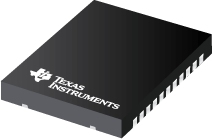Datasheet Texas Instruments TPS56121DQPT
| Manufacturer | Texas Instruments |
| Series | TPS56121 |
| Part Number | TPS56121DQPT |

4.5V to 14V Input, 15A Synchronous Step-Down SWIFT™ Converter 22-LSON-CLIP -40 to 125
Datasheets
TPS56121 4.5-V to 14-V Input High-Current Synchronous Buck SWIFTв„ў Converter datasheet
PDF, 1.3 Mb, Revision: D, File published: Feb 9, 2016
Extract from the document
Prices
Status
| Lifecycle Status | Active (Recommended for new designs) |
| Manufacture's Sample Availability | Yes |
Packaging
| Pin | 22 |
| Package Type | DQP |
| Industry STD Term | LSON-CLIP |
| JEDEC Code | R-PSSO-N |
| Package QTY | 250 |
| Carrier | SMALL T&R |
| Device Marking | TPS56121 |
| Width (mm) | 5 |
| Length (mm) | 6 |
| Thickness (mm) | 1.5 |
| Pitch (mm) | .5 |
| Max Height (mm) | 1.5 |
| Mechanical Data | Download |
Parametrics
| Control Mode | Voltage Mode |
| Duty Cycle(Max) | 93 % |
| Iout(Max) | 15 A |
| Iq(Typ) | 2.5 mA |
| Operating Temperature Range | -40 to 125 C |
| Package Group | LSON-CLIP |
| Rating | Catalog |
| Regulated Outputs | 1 |
| Special Features | Adjustable Current Limit,Enable,Power Good,Pre-Bias Start-Up,Synchronous Rectification |
| Switching Frequency(Max) | 1000 kHz |
| Switching Frequency(Min) | 300 kHz |
| Type | Converter |
| Vin(Max) | 14 V |
| Vin(Min) | 4.5 V |
| Vout(Max) | 12 V |
| Vout(Min) | 0.6 V |
Eco Plan
| RoHS | Compliant |
| Pb Free | Yes |
Design Kits & Evaluation Modules
- Evaluation Modules & Boards: TPS56121EVM-601
Evaluation Module for TPS56121 High Current (15A) Synchronous Step-Down SWIFTВ™ Converter
Lifecycle Status: Active (Recommended for new designs)
Application Notes
- Calculating EfficiencyPDF, 175 Kb, File published: Feb 19, 2010
This application report provides a step-by-step procedure for calculating buck converter efficiency and power dissipation at operating points not provided by the data sheet. - Demystifying Type II and Type III Compensators Using Op-Amp and OTA for DC/DC CoPDF, 782 Kb, File published: Jul 11, 2014
- Understanding Thermal Dissipation and Design of a HeatsinkPDF, 59 Kb, File published: May 4, 2011
Power dissipation performance must be well understood prior to integrating devices on a printed-circuit board (PCB) to ensure that any given device is operated within its defined temperature limits. When a device is running, it consumes electrical energy that is transformed into heat. Most of the heat is typically generated by switching devices like MOSFETs, ICs, etc. This application report discu - Semiconductor and IC Package Thermal Metrics (Rev. C)PDF, 201 Kb, Revision: C, File published: Apr 19, 2016
Model Line
Series: TPS56121 (3)
- SN1109022DQPR TPS56121DQPR TPS56121DQPT
Manufacturer's Classification
- Semiconductors > Power Management > Non-isolated DC/DC Switching Regulator > Step-Down (Buck) > Buck Converter (Integrated Switch)
